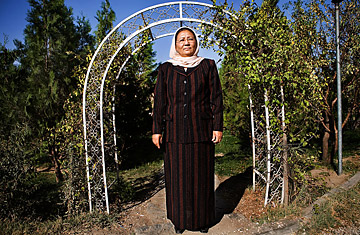
Habiba Sarabi should be wearing spurs and a sheriff's badge. The diminutive Governor of Bamiyan, one of Afghanistan's least developed provinces, is laying down the law. The environmental law, that is.
With all its problems, Afghanistan is not an obvious environmental role model. Decades of war have left its land and waterways scarred by pollution. Forests have been leveled for firewood. Mines dot the pathways of migratory animals, and unchecked urbanization is putting pressure on scarce resources. Determined to reverse the damage, Sarabi has embarked on a crusade to turn Bamiyan into Afghanistan's icon of environmental practice — leading the way, she hopes, for national change. "I am doing this for the future of my people," she says. "They may not understand now why it is so important, but if we can preserve the environment and our natural resources it will bring wealth for our children."
As a start, she is establishing Afghanistan's first national park. The 220-sq.-mi. (570 sq km) area encompasses a cascading series of six brilliantly hued lakes, and naturally carved limestone fortresses that rival the Grand Canyon for awe-inspiring magnificence. Band-i-Amir, as it is known, was largely ignored during the war. Now that relative peace prevails in the province, it is once again a favorite weekend destination for local tourists, who threaten to love it to death.
Sarabi decided to step in. She banned picnickers from parking vehicles on the fragile banks. She stopped a popular motorboat service that ferried tourists from one end of the principal lake to the other, for fear that the vibrations — and the fuel — would disrupt the growth of the crystalline deposits that produce the area's spectacular geography. And, most controversially, she tore down the ramshackle restaurants and shops that had cropped up on the water's edge. They were an eyesore, she says, but more offensive was the fact that their owners dumped garbage and washed dishes in the lakes. "Normally you would allow people to build alternative shops before tearing down their livelihoods," says Peter Smallwood, country director for the Wildlife Conservation Society, which has partnered with Sarabi to create the park. But she got the job done.
And these days, she doesn't have to do it alone. Sarabi has inspired local communities to join her environmental campaign: now she sits on a committee made up of village representatives who together decide on policy and plan education projects. The local businesses, which at first resisted her initiatives, have also taken up the cause. The only problem, complains park ranger Abdul Wahab, is the tourists: "Everyone here has learned to put the garbage in the right place. But the visitors don't, and we can't get angry because they don't know better."
That doesn't stop Sarabi. At the end of a ceremony to celebrate the opening of the new visitor center in June 2007, she watched the participants, including an Afghan National Army platoon, drift away leaving empty water bottles and food wrappers behind. Sarabi summoned the soldiers back and lectured them on littering. "I told them that their behavior was shameful, and that part of their national service was keeping their country clean," she says. You can almost hear those spurs clinking.